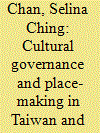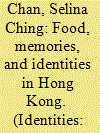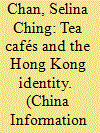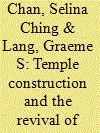|
|
|
Sort Order |
|
|
|
Items / Page
|
|
|
|
|
|
|
| Srl | Item |
| 1 |
ID:
105857


|
|
|
|
|
| Publication |
2011.
|
| Summary/Abstract |
This article compares cultural governance in Taiwan and China through their respective place-making processes. It investigates how cultural polices objectify tradition and popularize cultural landscape in local places for economic development and identity politics. Contrary to what would be commonly expected, the Chinese government adopted a minimalist approach while the Taiwanese government was much more hands-on. The sociopolitical histories of the two governments and their objectives are examined to understand this difference. In addition, the reactions of the locals to cultural policies in the two places are also contrasted. Finally, the different effects of cultural governance in China and Taiwan are examined. In particular, it was found that communal relations have deteriorated in China but strengthened in Taiwan as a result.
|
|
|
|
|
|
|
|
|
|
|
|
|
|
|
|
| 2 |
ID:
096479


|
|
|
|
|
| Publication |
2010.
|
| Summary/Abstract |
This article adopts a processual and relational approach to study food remembrance and investigates how different ways of appropriating food reveal the politics of identities in Hong Kong. It examines how food memories reveal relationships between the past and the present, reflect epochal transformation, and mark changing identities of various groups of people through new ways of appropriations. It takes the case study of pancai, a special banquet food for the villagers in the New Territories of Hong Kong, to examine the relationships between food and identities. This article investigates how pancai is remembered, popularized, and reinvented with different variations and embodies shifting meanings for the New Territories inhabitants as well as other Hong Kong people in changing socioeconomic and political environments. Pancai has been imbued with multiple layers of significance, involving linkages between local and national, emigration and Chineseness, urbanization and rural heritage, as well as decolonization and identity politics. As identities are by nature negotiable, situational, and fluidic, pancai's multiple layers of meanings correspond to different levels of identities-identities of the New Territories inhabitants, the rest of the Hong Kong people, and the mainland Chinese.
|
|
|
|
|
|
|
|
|
|
|
|
|
|
|
|
| 3 |
ID:
170190


|
|
|
|
|
| Summary/Abstract |
This article examines the meanings of caa caan teng (茶餐廳, local cafés) in Hong Kong and the implications of such cafés on the Hong Kong identity. It argues that the local café is a representation of Hong Kong culture because it reflects Hong Kong’s political, economic, and social developmental paths and mirrors the everyday life of its people. I investigate how the interaction of different immigrant cultures in Hong Kong has resulted in the invention of hybrid foods at the local café. These foods demonstrate hybridity as the transgression of boundaries through the negotiation of cultural differences among migrants, as well as those between migrants and colonialists. I argue that hybridity in local cafés reflects the power relations among the locals in Hong Kong, between locals and colonialists, and between locals and the new authorities in Beijing. Hybridity found in local cafés symbolizes the Hong Kong identity, as an entanglement between the multiplicity of Chinese ethnicities and the colonial modernity as characterized by flexibility, efficiency, choice, and diversity. These features differentiate the Hong Kong people from the colonialists and the mainlanders, thus constructing their identity and subjectivity, as former colonial subjects now living in the ‘periphery’ of the motherland.
|
|
|
|
|
|
|
|
|
|
|
|
|
|
|
|
| 4 |
ID:
076887


|
|
|
|
|
| Publication |
2007.
|
| Summary/Abstract |
This article examines a case of temple construction that was initiated by officials and cadres rather than by locals. The temple construction and religious revival are analyzed in the light of complex dynamics between the cadres at the United Front, provincial office, municipal government, township office, and religious bureau, as well as between these cadres and the locals-the intellectuals, village elders, religious specialists, and villagers. For the cadres and officials, the temple was intended as local heritage to attract tourists and ultimately to boost the local economy. However, the temple did not draw sufficient visitors as planned, whether foreign or local. On the other hand, the popularity of the deity associated with the temple took off. We suggest that whether the villagers identify culturally with the temple and lend it their support is crucial in determining its success. The fate of the temple will hence depend ultimately on the ability of the management committee to mobilize and involve local networks in the temple's activities.
|
|
|
|
|
|
|
|
|
|
|
|
|
|
|
|
|
|
|
|
|